
What is the problem?
According to Ukraine's Ministry of Social Policy, almost 4.9 million internally displaced people are registered in Ukraine. About half a million residents left the Donetsk region alone. People leave dangerous areas, fleeing shelling or winter without heating.
But having moved to the village for the winter, how can they find shelter? Where to look for housing for a large family with children and pets?
What is the solution?
For many, abandoned houses became such a refuge. So, people in the small village of Kapustyntsi, Romny district, Sumy region, arranged homes for the displaced and gave several migrant families jobs. Abandoned houses, which had been closed for decades, became a refuge for people fleeing the war.
How the idea of giving housing to people united the inhabitants of the village and how it works from the point of view of the law, we tell in Rubryka's article.
How does it work?
Housing for displaced people

Kapustyntsi Village, Sumy region
When russia's full-scale invasion began, millions of Ukrainians had to leave their homes, fleeing from the aggressor. Hundreds of thousands lost their homes. For many, Ukrainian villages became the obvious choice in search of shelter — and the village of Kapustyntsi in the Sumy region was no exception. What's more, after February 24, migrants were openly invited here: village head Svitlana Kulinych recalls that it all started with an invitation post on Facebook.
"Nothing unites people like trouble. Today it is the only one for everyone," says Svitlana Kulinych, who adds that in such circumstances, the villagers simply couldn't help but support their compatriots who had lost everything.
Yana Akulova, with her three daughters and two cats, are migrants from the Donetsk region. The woman found out on the Internet that housing is provided in Kapustytsi.
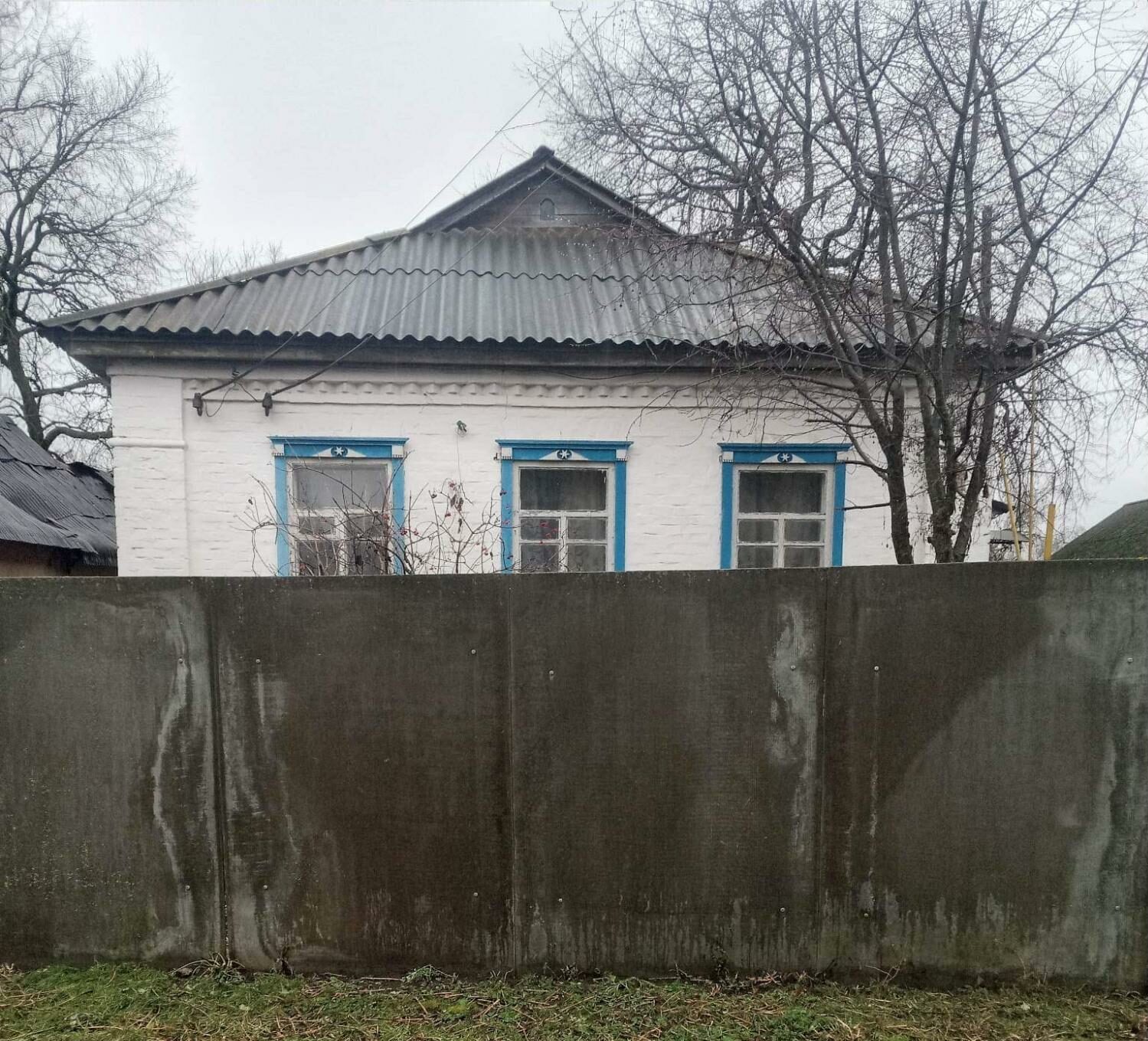
The village prepared this house for Akulova's family
"Should people go to the village? Everyone has to decide for themselves. Search, find out, and talk to the elders. I think they will help. I know firsthand that it is challenging to leave home, but I believe we will soon be able to return. My daughters miss home very much," the woman shares, but she is slowly getting used to her new place. Millions of Ukrainians share a similar experience: they must arrange a new, temporary home for themselves before returning home. And here, there is no better support than the active help of the community in a new location.
To prepare housing for the displaced people, the residents of Kapustyntsi worked hard, and the village head pushed for this support: the woman single-handedly went around all the abandoned houses. She contacted the owners and heirs of the homes. If they agreed to let in guests, she organized repairs and maintenance.
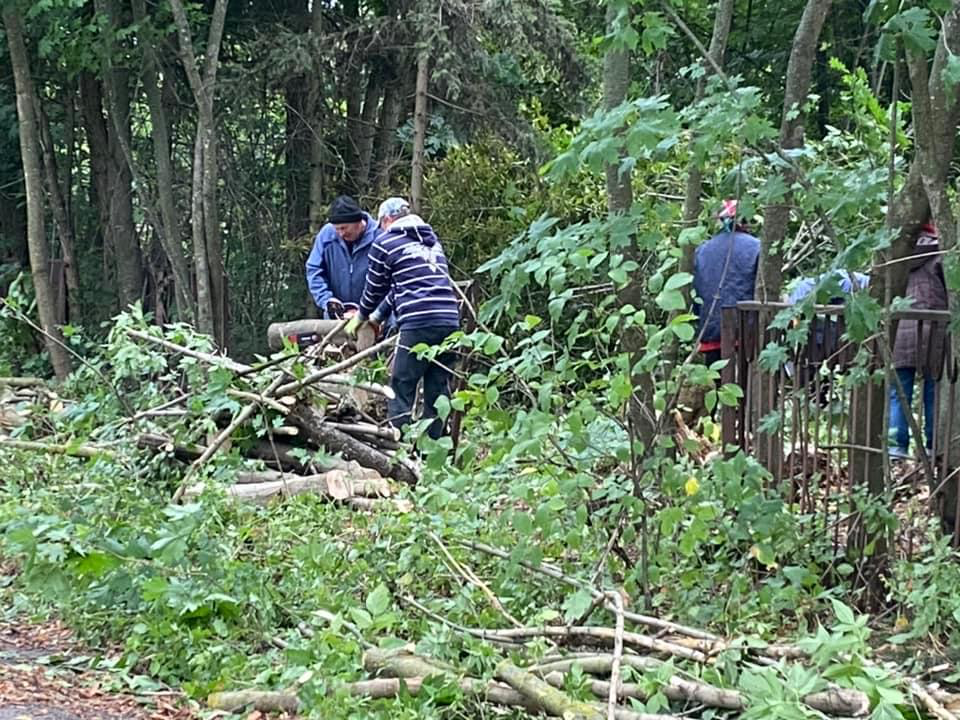
Villagers came with their brushes, brooms, and shovels. The equipment was brought in. The yards were cleared. They worked on such farms for free, and a local agricultural company provided the materials for repairs.
In addition, the Kapustyntsi village council was looking for not only housing but also jobs for the migrants. Employment often became a priority: for IDPs, just having a place is not enough. It is also vital to get the opportunity to earn a living again. Thus, Yana Akulova could get a job as a teacher at the Kapustyntsi school and, at the same time, began to obtain a second higher education. There were also cases when people who responded to Svitlana Kulinych's ad could find work in their specialty through acquaintances in other districts. Later, they also looked for housing there.
How does it work?
Kapustyntsi is a small village, but warm and friendly. About 700 residents live in the village permanently, and 167 internally displaced persons have settled here since February. Not all of them "settled down": many had already returned to their native regions when it became calmer there. But thirty migrants stayed and became part of the community.
The full-scale war rallied people even more: when the territorial defense units were created in the village, the entire village came to register, even the displaced people.
"The people in our village are kind and friendly. When new residents arrived, they tried to help everyone as much as possible. They brought the furniture, carpets, clothes, and food products," says Svitlana Kulinych, the village head. The village council also helps solve household problems: "Those who don't have gas heating need help to buy firewood. We don't live in a war zone, so the village council cannot provide IDPs with firewood for free, but we give permits to remove green vegetation. So the displaced people who need firewood can provide for themselves: in the village, to live, you need to work," adds Svitlana Kulinych.
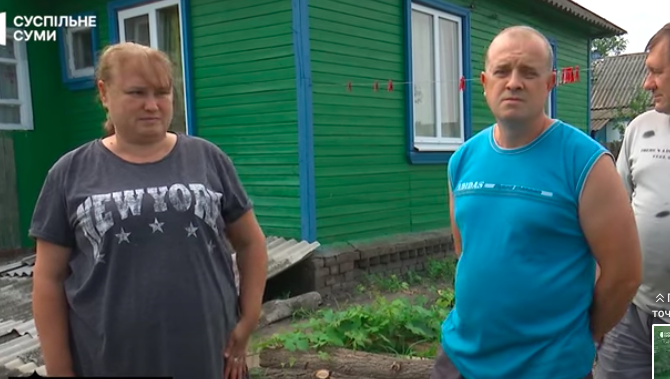
Olha Pleshyva and Vladyslav Pleshyvyi
Olha Pleshyva and Vladyslav Pleshivyi came to the Kapustyntsi from the city of Popasna (Luhansk region). In peacetime, both worked at the Popasna Carriage Repair Plant. As a result of russian shelling, the factory burned down before their eyes. Olha and Vladyslav managed to leave the burning city with the help of volunteers only on March 29.
A couple who lost everything found a new home in the Sumy region. "People in the village are kind and responsive. Everything was brought to us — furniture, bed linen, dishes, and products. In the spring, we planted the garden with seeds shared by locals. But those who dare to move to the village should not expect only help. In the village, you have to rely on yourself. They will help at first, but then you will do it yourself. It is difficult morally and financially," says Olga Pleshyva.
But there will always be a job for those who want to work. Currently, Olha works at a sewing factory in a nearby village. She is brought to work by a bus organized by the company. Vladyslav is employed at a local school. Together, they continue to live in a new home because, in Popasna, the occupiers destroyed not only their native factory but also their house.
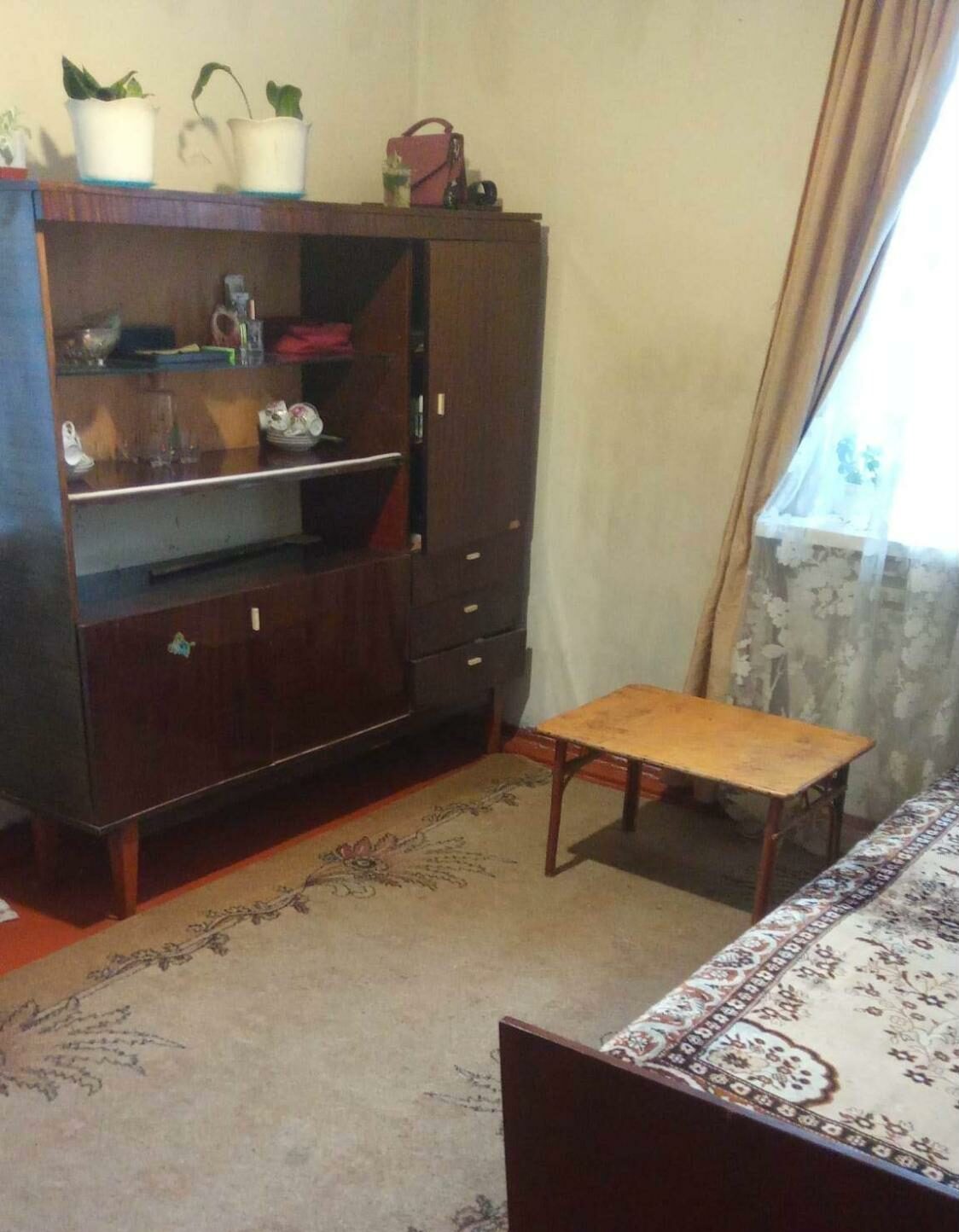
The new home of Olha and Vlad
However, not all owners of houses in Kapustyntsi were ready to allow migrants to live in them temporarily: instead, they offered to buy the property. For such cases, the village also found a solution: these houses were purchased by the owner of an agricultural company, Svitlana Hryshchenko, to later house IDPs there free of charge. But the preparation of all documents and the transfer of ownership by law was very painstaking work, village head Svitlana Kulinych recalls.
"I now remember how many difficulties we had to go through to arrange everything legally. You wouldn't even wish that on an enemy," says the woman. What is the matter?
Bureaucratic pitfalls
The fact is that not all abandoned real estate in the village could be bought quickly. Abandoned houses are often houses whose owners have died. Difficulties arose because, in some cases, the village did not have any documents confirming ownership of certain houses. Therefore, it was necessary to re-produce technical passports, collect certificates confirming the residence of the deceased owners, then register the inheritance for the heirs and even buy the house to settle the IDP family there.
All these actions required time and money: even though the cost of the old house is, on average, 50-60 thousand hryvnias, the "registration" of the home costs several additional tens of thousands: only the registration of the inheritance is 23 thousand hryvnias, and the same amount goes to the re-registration for the new owner.
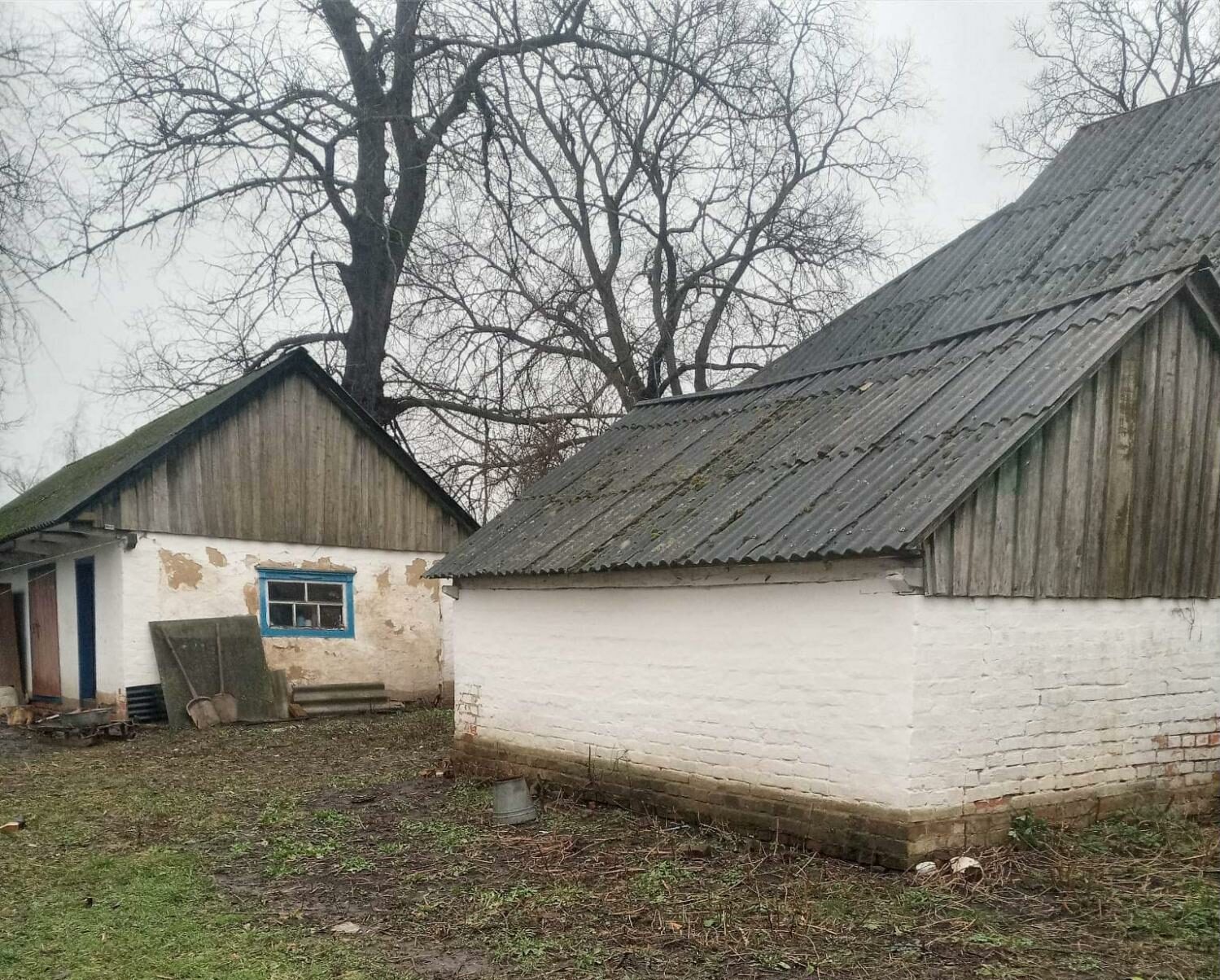
"The situation when abandoned houses do not have documents is not uncommon in Ukrainian villages," says Ms. Svitlana. "It would be good if appropriate laws were adopted in Ukraine regarding the simplified procedure for registration of real estate. At present, this is very painstaking work. And because of the war, there will be much more cases when housing documents can be lost."
What are the legal solutions?
As legal consultant Maksym Smirnov explains, this can indeed be a challenge. In some Western countries (for example, Great Britain or Spain), the legal framework allows people who do not have their own home — migrants or homeless people — to use abandoned housing, real estate that has been vacant for a certain period (six months, a year or more). In Ukraine, arbitrary settlement can be qualified as Art. 356 of the Criminal Code (arbitrariness).
However, in the civil law of Ukraine, there is a concept of acquiring the right to an ownerless thing (Article 335 of the Civil Code of Ukraine) — it can also be housing. According to this norm, an item with no owner or whose owner is unknown is considered unowned. Ownerless immovable things must be registered by the body that carries out the state registration of rights to immovable property at the request of the local self-government body on whose territory they are located. And the transfer of ownerless immovable property to public ownership is carried out exclusively by a court decision.
"To feel confident about housing, when buying, renting, or receiving it as a gift from the community and that previously had the status of ownerless, be sure to ask community officials for the original court decision with a note that this decision has entered into force. Without such a decision and the specified mark, any contract between you will not have legal force. That is, it will be invalid (Article 215 of the Civil Code of Ukraine)," the lawyer explains.
Important! Property cannot be recognized as ownerless if its owner is known but their whereabouts are unknown.
What should you pay attention to when buying a house from an owner?
📌 During martial law, it should be remembered that if men of conscription age (from 18 to 60 years old) are registered in the house, problems may arise with removing him from the register at the military enlistment office, especially if:
- the man takes part in hostilities,
- his whereabouts are unknown,
- he is abroad (for example, on earnings or as a long-distance sailor).
However, in the case of staying abroad, this problem is solved by providing a power of attorney for deregistration, which can be issued by the embassy or consulate of Ukraine located in this country. In this case, a person authorized by him has the right to remove him from registration in the housing you want to buy on his behalf.
📌 If one or more minors are registered in the house that you are buying or receiving under a donation contract, the execution of the alienation agreement requires the permission of not only the legal representatives of the minor (parents, guardians, or adoptive parents) but also the consent of the local guardianship authorities, which carry out an appropriate check regarding the guarantee of preserving the child's rights to housing.
📌 Often, during the actual purchase, the parties draw up a donation contract (this allows you to save money). The expert warns: there is a big "pitfall" here. Suppose the actual seller (according to the documents, the donor) applies to the court with a lawsuit to declare the donation agreement invalid and, in support of their arguments, provides a receipt stating that they received a certain amount of money from the actual buyer (according to the agreement, the gifter). In that case, there is a high probability that the court will find the agreement invalid. The fictitious "donor" will once again become the owner of the previously "donated" home. Then, to get the money back, the "gifter" will have to file a separate lawsuit and wait for justice for a long time.
The fact is that the critical feature of a donation, according to the Civil Code of Ukraine, is its gratuity. "During the 24 years of my legal practice, I have met various swindlers and black brokers several times. Those who repeatedly concluded similar pseudo-agreements, and after them and the court were left with both real estate and money! Therefore, be very careful with the execution of a fictitious donation contract!" lawyer Maksym Smirnov emphasizes.
Even more helpful solutions!
Aiding not only displaced people but also the village
Displaced people from war-torn regions can breathe new life into Ukrainian villages, replenish the small rural population, and save villages from extinction.
The Kapustyntsi village district began accepting new people even before the full-scale war. As the village head Svitlana Kulinych said, they started taking steps to revive the village last year; then, to save the school from closing, families with many children were invited to the village.
"We will be full first classes for the next two years. And then we'll see. While the war is going on, I consider it a crime to close a school. Especially since now it is difficult to drive children to schools in other villages, and also expose them to danger," says the village head.
Migrants who find a new, albeit temporary, home in the village are also drivers of local development. Becoming a part of the local community, they support the economy, local initiatives, a school, and leisure. And this proves once again: mutual help and support make us stronger. Always.
This article was created by the Rubryka online publication within the Ukraine Rapid Response Fund program, implemented by IREX with the support of the US State Department. The content is the sole responsibility of the Rubryka online publication and does not necessarily reflect the views of IREX or the US State Department.
Newsletter
Digest of the most interesting news: just about the main thing









